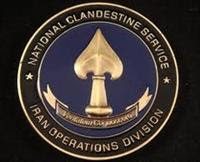News
Today The New York Post took U.S. and Israel covert action embolden Iran nuclear ambitions
.jpg)
With Secretary of State Hillary Clinton’s lack stance against Iran’s nuclear development program which began fueling the core of its first nuclear reactor at Bushehr with Russian oversight, which will be in full swing in months. Yet the critics tend to forget how U.S. intelligence tried to destabilize Iran’s government for years even when they were on the verge of suspending the quest for nukes.
Secretary Clinton said the U.S. is concerned with “secret” nuclear sites only and that “Iran is entitled to the peaceful use of nuclear power. They are not entitled to a nuclear-weapons program."
But the New York post accused Obama and the State department of enabling the program though inaction and toothless sanctions:
Clinton has glossed over a terrible truth: The Obama administration now considers Iran a fellow nuclear power -- one as yet unarmed, yet someday soon, perhaps, a nuclear equal, fully armed.
But the US cannot acquiesce in this -- or the whole Middle East will fall under the mullahs' sway.
That would confer an Iranian chokehold on the Strait of Hormuz, through which transits 90 percent of the Gulf's oil exports. It means Iranian supremacy over Shiite neighbors like Iraq and even Sunni rivals like Saudi Arabia.
Worst of all, it puts Israel on the brink.
Bob Rob Grace of Asian Times Online said that for years, the United States and Israel have engaged in a covert effort to destabilize Iran's government and sabotage its nuclear program and by ignoring these efforts the current debate about the relative wisdom of diplomacy, sanctions, and preventive military action addresses an incomplete picture.
To understand the Iranian historical perspective one cannot forget U.S. grievous misdeeds that all began in 1953, when, based on extending the containment policy to the Middle East, the U.S. and British mounted a coup that overthrew an extremely popular Iranian leader, Mohammed Mossadegh – which ended Iran’s first democratic government. Mossadegh, a leader that put the devastated Iranian state on the road to prosperity by securing a larger portion of its own oil reserves from the grasp of Western greed, was replaced by Shah Pahlavi, an incompetent tyrant, and as a byproduct, Iran’s oil wealth was transferred to British and American control, while the Iranian masses wallowed in abject poverty.
The Shah’s corruption enabled Ayatollah Ruhollah Khomeni to stage the 1979 Islamic Revolution, which led to the installation of an extremist Islamic government. The C.I.A. and British secret service tried everything in their power to oust the Ayatollah, but eventually the Western powers relied on a dubious ally - Saddam Hussein - to prosecute war against Iran. The ensuing eight-year war between Iran and Iraq led to one million Iranian causalities and deaths, while the U.S and Brits, with some help from Israel, provided arms, intelligence and financing to Iraq, along with chemical weapons - including anthrax.
During the Iran hostage crisis Iran only agreed to free its captives after the U.S. pledged non-intervention in Iranian affairs. As stated in the 1981 Algiers Accords, "it is and from now on will be the policy of the United States not to intervene, directly or indirectly, politically or militarily, in Iran's internal affairs."
However, the U.S. has failed to live up to this agreement. In 1995, an $18 million covert effort by the CIA to destabilize Iran was exposed reinforcing Iranian suspicions of the "Great Satan". Covert efforts also disrupted negotiations in 2005 between Iran and the European Union after Iran had signed the Paris Accord in which Iran committed that it would "not seek to acquire nuclear weapons", voluntarily implement the International Atomic Energy Agency's (IAEA's) Additional Protocol, and voluntarily halt all uranium-enrichment activities.
In the mid-200s the US collaborated with the Mujahideen-e-Khalq, a group devoted to overthrowing Iran's government, in cross-border raids to gather intelligence about Iran's nuclear program and supported Jundallah, a Pakistani-based tribal terrorist group that has struck Iranian targets; and had established a "covert infrastructure" within Iran to reach out to Iranian dissidents. Then in 2005, the U.S. Congress authorized $3 million to fund "the advancement of democracy and human rights" in Iran, a move the Iranian UN ambassador called a "clear violation of the Algiers accords".
That same year Mossad, Israel’s intelligence agency, assassinated Iranian nuclear scientist Ardeshire Hassanpour. In 2008, President George W Bush signed a "non-lethal presidential finding" that initiated a CIA plan involving "a coordinated campaign of propaganda, disinformation and manipulation of Iran's currency and international financial transactions". The program was handed off to Obama who then accelerated it.
In January of 2009, the Telegraph reported that Israel was "using hitmen, sabotage, front companies and double agents to disrupt the regime's illicit weapons project". Reuters reported that Israel "planned to target Iranian nuclear scientists with letter bombs and poisoned packages", possibly as part of "a psychological warfare campaign".
Sanctions and covert activity has actually garnered domestic support for President Mahmud Ahmadinejad and have provided an "an excuse to the Iranian government to suppress the opposition", according to Iranian reformist Mehdi Karroubi. Iran strives for UN Security Council reform and global nuclear disarmament under the slogan, "nuclear energy for everyone, nuclear arms for no one".
However, though the US would like Iran to completely halt enrichment, a feasible middle ground exists. As former US secretary of state Colin Powell stated recently on Meet The Press:
... I think if you take them at their word, "trust, but verify," [former US president Ronald] Reagan's old line ... then put in place a set of sanctions that would be devastating to them if they violate that agreement, and then put in place an IAEA inspection regime ... you might be able to live with an Iran that has a nuclear power capability
Yet if Iran fears U.S. covert intervention will continue it is unlikely to sign any agreement of the sort Powell described. As Mr. Grace pointed out: “like in 1953, by pursuing the sabotage option, the US is sacrificing its long-term interests for short-term gains.”




Post a Comment
0 Comments